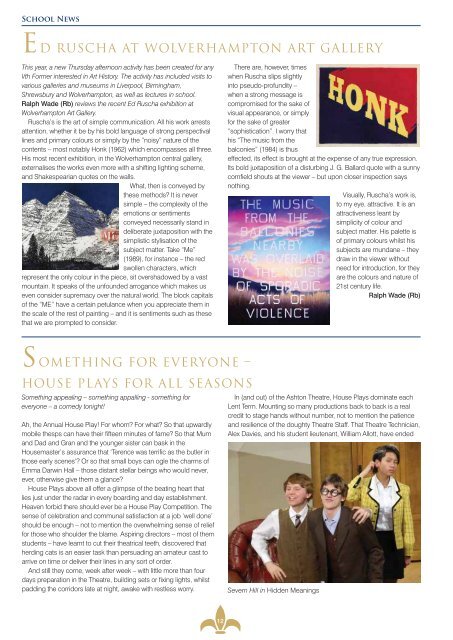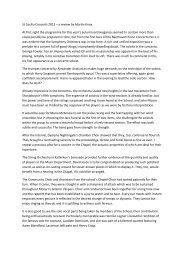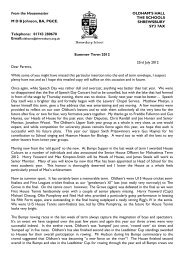SUMMER 2012 ISSUE No. 150 - Shrewsbury School
SUMMER 2012 ISSUE No. 150 - Shrewsbury School
SUMMER 2012 ISSUE No. 150 - Shrewsbury School
You also want an ePaper? Increase the reach of your titles
YUMPU automatically turns print PDFs into web optimized ePapers that Google loves.
<strong>School</strong> News<br />
E D RUSCHA AT WOLVERHAMPTON ART GALLERY<br />
This year, a new Thursday afternoon activity has been created for any<br />
Vth Former interested in Art History. The activity has included visits to<br />
various galleries and museums in Liverpool, Birmingham,<br />
<strong>Shrewsbury</strong> and Wolverhampton, as well as lectures in school.<br />
Ralph Wade (Rb) reviews the recent Ed Ruscha exhibition at<br />
Wolverhampton Art Gallery.<br />
Ruscha’s is the art of simple communication. All his work arrests<br />
attention, whether it be by his bold language of strong perspectival<br />
lines and primary colours or simply by the “noisy” nature of the<br />
contents – most notably Honk (1962) which encompasses all three.<br />
His most recent exhibition, in the Wolverhampton central gallery,<br />
externalises the works even more with a shifting lighting scheme,<br />
and Shakespearian quotes on the walls.<br />
What, then is conveyed by<br />
these methods? It is never<br />
simple – the complexity of the<br />
emotions or sentiments<br />
conveyed necessarily stand in<br />
deliberate juxtaposition with the<br />
simplistic stylisation of the<br />
subject matter. Take “Me”<br />
(1989), for instance – the red<br />
swollen characters, which<br />
represent the only colour in the piece, sit overshadowed by a vast<br />
mountain. It speaks of the unfounded arrogance which makes us<br />
even consider supremacy over the natural world. The block capitals<br />
of the “ME” have a certain petulance when you appreciate them in<br />
the scale of the rest of painting – and it is sentiments such as these<br />
that we are prompted to consider.<br />
S OMETHING FOR EVERYONE –<br />
HOUSE PLAYS FOR ALL SEASONS<br />
Something appealing – something appalling - something for<br />
everyone – a comedy tonight!<br />
Ah, the Annual House Play! For whom? For what? So that upwardly<br />
mobile thesps can have their fifteen minutes of fame? So that Mum<br />
and Dad and Gran and the younger sister can bask in the<br />
Housemaster’s assurance that ‘Terence was terrific as the butler in<br />
those early scenes’? Or so that small boys can ogle the charms of<br />
Emma Darwin Hall – those distant stellar beings who would never,<br />
ever, otherwise give them a glance?<br />
House Plays above all offer a glimpse of the beating heart that<br />
lies just under the radar in every boarding and day establishment.<br />
Heaven forbid there should ever be a House Play Competition. The<br />
sense of celebration and communal satisfaction at a job ‘well done’<br />
should be enough – not to mention the overwhelming sense of relief<br />
for those who shoulder the blame. Aspiring directors – most of them<br />
students – have learnt to cut their theatrical teeth, discovered that<br />
herding cats is an easier task than persuading an amateur cast to<br />
arrive on time or deliver their lines in any sort of order.<br />
And still they come, week after week – with little more than four<br />
days preparation in the Theatre, building sets or fixing lights, whilst<br />
padding the corridors late at night, awake with restless worry.<br />
12<br />
There are, however, times<br />
when Ruscha slips slightly<br />
into pseudo-profundity –<br />
when a strong message is<br />
compromised for the sake of<br />
visual appearance, or simply<br />
for the sake of greater<br />
“sophistication”. I worry that<br />
his “The music from the<br />
balconies” (1984) is thus<br />
effected, its effect is brought at the expense of any true expression.<br />
Its bold juxtaposition of a disturbing J. G. Ballard quote with a sunny<br />
cornfield shouts at the viewer – but upon closer inspection says<br />
nothing.<br />
Visually, Ruscha’s work is,<br />
to my eye, attractive. It is an<br />
attractiveness leant by<br />
simplicity of colour and<br />
subject matter. His palette is<br />
of primary colours whilst his<br />
subjects are mundane – they<br />
draw in the viewer without<br />
need for introduction, for they<br />
are the colours and nature of<br />
21st century life.<br />
Ralph Wade (Rb)<br />
In (and out) of the Ashton Theatre, House Plays dominate each<br />
Lent Term. Mounting so many productions back to back is a real<br />
credit to stage hands without number, not to mention the patience<br />
and resilience of the doughty Theatre Staff. That Theatre Technician,<br />
Alex Davies, and his student lieutenant, William Allott, have ended<br />
Severn Hill in Hidden Meanings





